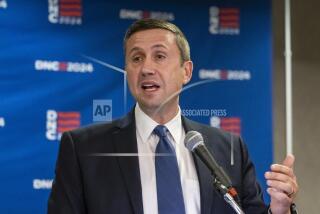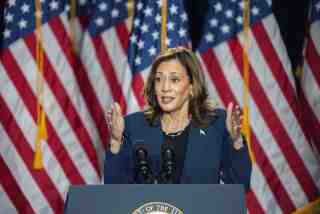GOP Meets to Select New Chairman : Republicans: All five candidates talk of party renewal at the grass-roots level. But their differences mirror the divisions in the political organization.
- Share via
ST. LOUIS — Still smarting from their election loss and scornful of their departing leaders, ranking Republicans met Thursday to select a new party chairman, eyeing five candidates who stress unity but whose links to opposing factions and presidential hopefuls mirror the party’s deep clefts.
On the surface, the three-day meeting of the 165-member Republican National Committee to pick a new leader opened Thursday with a collegial sense of purpose: All five men seeking the post are conservatives who talk of renewing the party at the grass-roots level and loosening ties to the Washington Establishment that called the shots for 12 years.
But the mounting heat produced by this campaign has burnished the differences between the candidates and exposed hints of their ties to the forces buffeting the party--presidential aspirants, religious and anti-abortion elements, even the tattered remains of George Bush’s reelection apparatus.
Party veterans say none of the five--retiring Missouri Gov. John Ashcroft, Mississippi lawyer and political consultant Haley Barbour, Republican Congressional Committee Co-Chairman L. Spencer Abraham, former Army Secretary Howard H. (Bo) Calloway and Oregon party Chairman Craig L. Berkman--appear to have enough support to muster a first-ballot victory this afternoon.
Party regulars described Barbour and Abraham as the perceived front-runners, with Ashcroft, who gained national exposure last fall as a Bush campaign speaker, not far behind. But arriving committee members said up to 40% of the voting members appeared uncommitted.
Committed or not, some of the arriving committee members projected a prickly impatience with the soothing promises made by consultants and cellular phone-wielding floor whips. After 12 years of taking orders from Administration officials, some party officials gleefully flexed their independence.
Outside one reception, a Midwestern committeeman poked a startled staffer in the chest and huffed: “You’re beginning to sound exactly like the dolts we had to endure for the last four years.”
Karen Hughes, the executive director of the Texas Republican Party, said a “strong anti-Washington Establishment” mood pervades the gathering. “I think the deciding factor in the vote is who the members believe will allow them to be part of the process,” she said. “You don’t mind being a rubber stamp body when you win. But when you lose . . . .”
As they lobbied near well-stocked buffet tables in Hyatt Regency hotel hospitality suites and in secluded speeches in spare meeting rooms, the five contestants tried to capitalize on that sense of frustration. They echoed a growing cadre of party regulars who think that Bush’s presidential campaign was fatally flawed by the party’s failure to project a “big tent” image to a diverse nation.
“The sense that the party needs to be inclusionary is playing pretty well here,” said Eddie Mahe, a Republican political consultant who flew in from Washington to lobby for Calloway.
That yearning for a broader, more tolerant Republican Party masks a fear among many stalwarts that they are in danger of a grass-roots takeover by the religious right.
Mary Alice Lair, a national committeewoman from the small southeast Kansas town of Piqua, worries about the “new people,” her hushed description of Christian right volunteers who have swelled party membership rolls in her Republican precinct.
“We need to find ways to show the new people that we’re OK and to teach them how to operate as one group,” Lair said. “We need a chairman who can show the precincts how to organize properly.”
But even as candidates talked earnestly about tinkering with the grass roots, listening to regulars outside the Washington Beltway and turning a deaf ear to well-heeled consultants, they were relying on time-tested Capitol contacts and imported consultants to sway uncommitted members.
And, as they promised a turn in the party’s fortunes by welcoming all of its embittered factions, the five candidates were busy attacking each other for their links to future presidential contenders as varied as former Vice President Dan Quayle and Texas Sen. Phil Gramm, to Christian fundamentalist leaders like Pat Robertson and even to CBS News.
Abraham, a Michigan Republican leader, is selling himself as a leading candidate for change based on his roles in revitalizing his state’s party, in paring consultants’ costs and, as chairman of the congressional campaign committee, in funneling more money last year to Republican House candidates. But his opponents have attacked him for being openly supported by Quayle, who employed him as an aide.
Barbour, one of the earliest to announce his candidacy, has been criticized for his close ties to Gramm--thought to be a presidential possibility--and for representing CBS News against the Bush Administration in a battle over a cable TV bill last year.
Ashcroft has emphasized his recent role as a party spokesman in his bid to do similar work as party chairman. But it is Ashcroft’s very influence that may have prevented him from gaining an edge. His prominence in drafting the party’s platform last year has hurt him, some moderates say. And, like Abraham, he is burdened by his links to some of the powerful influences aiding him. Current RNC Chairman Richard N. Bond is said to favor him, as are a number of influential Christian right figures impressed with his strong anti-abortion stance. That kind of backing hurts the former governor as much as it aids him, party regulars said.
Calloway, who runs a political action committee founded by Rep. Newt Gingrich (R-Ga.), is beloved by many committee members. But he is believed to be a long shot because, at 67, “he’s just too old,” one Abraham backer said.
Berkman, an Oregon moderate who prefers that the party move away from its anti-abortion and anti-gay-rights planks, is said to be limited by his regional support.
More to Read
Get the L.A. Times Politics newsletter
Deeply reported insights into legislation, politics and policy from Sacramento, Washington and beyond. In your inbox twice per week.
You may occasionally receive promotional content from the Los Angeles Times.









